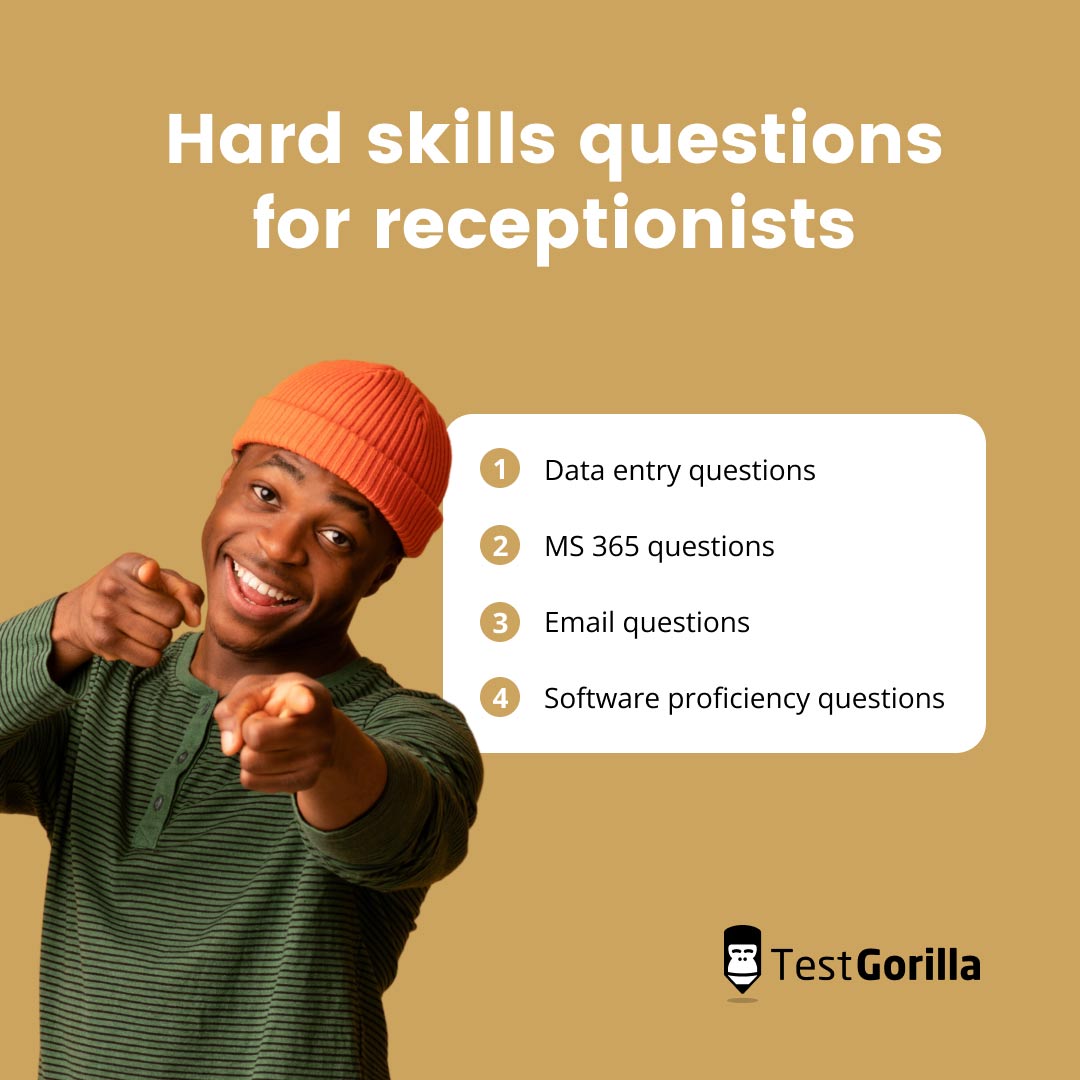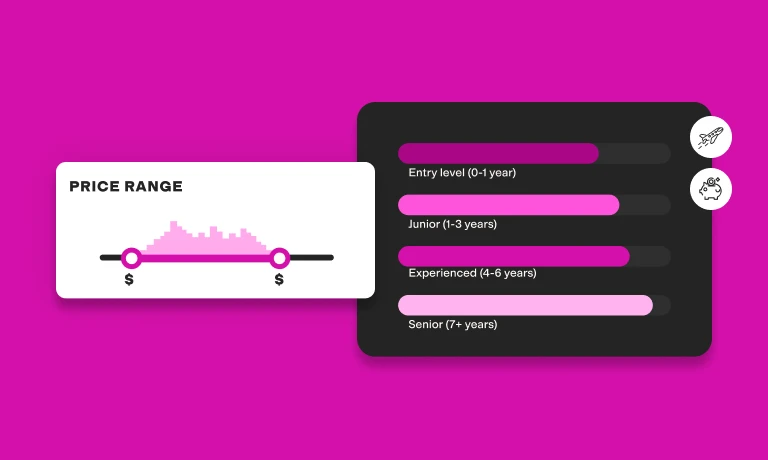Receptionists are the first point of contact for your clients and prospects when they reach out to your organization. Hiring the wrong candidate for the role can create negative first impressions of your company, as well as cause internal inefficiencies and miscommunication.
Alternatively, skilled receptionists should enhance your organization by providing exceptional customer service alongside problem-solving, organizational and multitasking abilities, and the technical proficiencies needed to succeed.
In this article, we’ve put together 23 receptionist test questions and answers to help you confidently choose the right applicant. Avoid mis-hires and poor interview experiences, and instead, find the key traits to look for and how to roll out your interview questions.
Why are pre-employment assessments important when hiring a receptionist?
Pre-employment assessments take you beyond the limitations of resumes and let you evaluate the soft and hard skills necessary for a candidate to succeed in the role.
You can assess skills such as software proficiency and email usage to measure speed and efficiency, as well as communication and problem-solving to see if your candidates can handle unexpected situations and still impress your clients.
Pre-employment assessments offer an objective and unbiased evaluation of your candidates’ qualifications, personality, and cognitive ability, to name a few.
Want to find out more? TestGorilla has a guide to hiring your next receptionist.
What traits should you be looking for when hiring a receptionist?
Receptionists require a broad range of skills and traits to succeed in their roles. Not only do they need the technical skills to manage switchboard operations, email, word processing software, and other tech, but they should also have the soft skills necessary for client engagement and smooth workplace processes.
This non-exhaustive list highlights some of the most valuable traits to look for when interviewing candidates for a receptionist role:
Communication
Problem-solving
Time management
Customer service
Teamwork
Organization
Multitasking
Active listening
Attention to detail
Receptionists are the first point of contact at your organization so it’s important they represent your brand positively. Understanding a candidate’s personality type, values, and motivations can ensure they are the right culture fit and share your company ethos.
The best insights on HR and recruitment, delivered to your inbox.
Biweekly updates. No spam. Unsubscribe any time.
23 receptionist test questions and answers
We’ve drawn on our experience to create 23 receptionist test questions and answers. You can use them alongside these unique interview questions as part of your pre-employment assessment.
Communication questions for receptionists
Effective communication lies at the heart of a receptionist's role because they serve as the primary point of contact for internal teams and external stakeholders.
You’ll want to prioritize applicants who demonstrate empathy, adaptability, and an understanding of different forms of communication.
On the other hand, applicants who exhibit abrupt communication styles may not be the right fit.
These questions help you gauge a candidate’s aptitude for this essential skill.
How have you adapted your communication to ensure clarity for individuals with different needs?
Discuss a time when you shared a difficult message with a team member or a client. How did you approach the situation?
Can you describe the different types of communication you use on the job (for example, phone, text, email)? How do you decide on the right type of communication and adapt your style for each situation?
Problem-solving questions for receptionists
When customers or team members are unhappy, receptionists are often the first line of defense. An individual with the ability to smooth out tensions and find answers can grow momentum and good morale.
As you ask the following questions, look for someone who can:
Correctly identify problems
Seek out resources and answers
Stay calm and resourceful in the face of challenges
You may want to steer clear if an applicant is easily overwhelmed or doesn’t show tact under pressure.
How would you handle a situation when you don't have an immediate answer to a customer's question?
Explain the biggest challenge you’ve faced in the workplace. How did you overcome it?
Time management and organization questions for receptionists
Receptionists who can manage busy seasons or handle many projects and requests at once reduce stress in the workplace and keep everything moving smoothly.
Look for applicants who demonstrate prioritization of tasks, good organization, and situational judgment.
Conversely, be wary if individuals have a hard time explaining how they would get multiple tasks completed under pressure.
Describe an especially busy time at work. How did you make sure everything was completed?
Think back to a time when you had to manage conflicting schedules. How did you prioritize and resolve the situation? How did you decide what was most important?
Customer service questions for receptionists
A welcoming customer service experience ensures a positive impression for everyone who interacts with your organization.
When evaluating a candidate’s customer care mindset, look for applicants who demonstrate:
An ability to remain composed and empathetic, even with challenging individuals
An understanding of what customers are looking for
A willingness to go the extra mile
A professional demeanor
During the interview, be aware of candidates who don’t appear to grasp the importance of customer service.
Can you share an example of a time when you exceeded a customer's expectations?
Can you explain the best service you have experienced as a customer yourself? What did you learn from this experience and how has it affected your job?
Can you describe what our customers might be looking for in interactions with you? How would you make sure you deliver that?
Attention to detail questions for receptionists
Small details can mean the difference between clarity and miscommunication, such as a schedule that works and a double-booked day. Look for applicants who demonstrate a commitment to error-free work and who take mistakes seriously.
You may not want to proceed with candidates who are casual about accuracy and details or who don't appear to learn from past mistakes.
What is your process for ensuring accuracy and smooth sailing in the workplace?
What has been the worst mistake you’ve made at work? What steps have you taken to make sure this never happens again?
Hard skills questions for receptionists
Data entry questions
Typing speed, the ability to use voice recognition software, and other data entry skills ensure information is entered into your office systems promptly and accurately. During interviews, seek out candidates who demonstrate:
A commitment to accuracy
An ability to use different data entry methods
Be wary of applicants who can’t explain how they ensure accuracy or who don’t have much experience.
How would you describe your data entry skills and accuracy?
What have you done to ensure progress in this area?
Describe your skills in typing, transcription, voice recognition software, and other systems you use to capture information.
MS 365 questions
Microsoft Word, Excel, OneDrive, PowerPoint, and Outlook are among the most commonly used tools. Every receptionist should know how to type a letter, send an email, create a spreadsheet, or build a presentation with these applications.
As updates and new versions are released regularly, look for candidates who are familiar with the most important features but who also have a plan for adapting as the suite evolves. An applicant who has a limited understanding of these tools may inhibit workplace productivity.
How proficient are you in using software such as Microsoft 365 (including Word, Excel, and Outlook)?
What features in MS 365 have you found most useful or have you been most excited by?
What future features are you anticipating in MS 365?
Email questions
In virtual and brick-and-mortar businesses, email is often the way teams stay connected and how clients get in touch. You’ll want to look for applicants who show:
Familiarity with advanced email features
An understanding of the importance of confidentiality
Candidates who don’t understand how easy it is to hit “send all” and accidentally share confidential information may not be the right hire.
What advanced email features and integrations are you familiar with?
How do you keep confidential information private when sending many emails?
How has your approach to electronic communication, including emails and virtual meetings, changed over time?
Software proficiency questions
Many organizations use multiple apps and software, and receptionists need to be able to use tools ranging from customer service management software to communication platforms to keep everyone on track.
Look for candidates who can easily adapt to new software and who are familiar with many types of applications.
Can you describe a time when you had to adapt quickly to new software at work? How did you manage to learn the features as fast as possible?
How do you handle multiple applications and software programs with differing functions? How do you make it all work?
During the interview, be aware of applicants who have limited technical knowledge or experience and who show a lack of interest to learn.
How to roll out interviews
A well-rounded hiring approach, that includes pre-employment tests and interviews, helps you objectively compare candidates.
TestGorilla makes it easy to use a multi-measure testing technique to ensure you hire the right talent, every time. The platform offers recommendations for tests you can use to measure skills, personality, and more.
For receptionists, use the following tests to gain a holistic view of your candidates:
Personality tests such as the DISC or Enneagram ensure your applicants have the right temperament
The Culture-Add test verifies candidates align with your company's culture
The Administrative Assistant test alongside selected Typing tests, Software Proficiency tests, and an Email Skills assessment evaluates necessary hard skills
The Customer Service test makes sure your candidates can anticipate and meet the needs of your clients
The Time Management test determines which individuals can keep up with a busy environment
The Communication Skills test evaluates how well applicants can use written and verbal skills
You can also create your own custom questions and combine them with some of the 23 discussed here.
Test results, recorded replies, and detailed reports are provided for each candidate, enabling you to see top applicants at a glance.
Hire your next receptionist with TestGorilla
Receptionist test questions and answers enable you to hire the right candidate by evaluating soft and hard skills.
Candidates who demonstrate strong communication, customer service, problem-solving, time management, and job-specific skills ensure you hire a professional who can step up to your customer and team needs.
TestGorilla makes pre-employment assessments and interviews easy, with a library of more than 300 scientifically validated tests and one-way video interviews. To find out more, sign up for a free plan or free demo, or take TestGorilla’s product tour.
You've scrolled this far
Why not try TestGorilla for free, and see what happens when you put skills first.



















